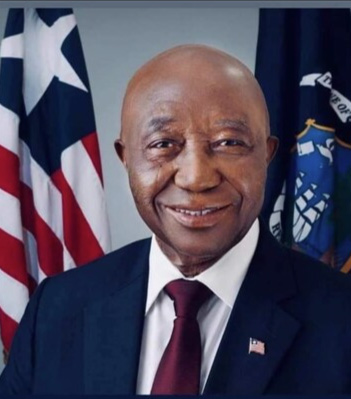By Jeffery Kazembe Batts
While meeting with five African heads of state recently, President Trump responded to comments made by Liberian President Joseph Boakal by inquiring, “Such beautiful English. Where did you learn to speak so beautifully? Were you educated? Where in Liberia? That’s very interesting”. The question and comment displayed a remarkable level of ignorance or contempt on the part of the 47th American president.
After being founded in 1816 by white Americans to deal with the “problem” of a growing number of free Blacks, starting in the 1820s, the American Colonization Society (ACS) embarked to help free-born African Americans and similarly enslaved African people who attained freedom, to establish settlements on the west coast of the African continent. English has been the official language of the area.
Beyond displaying a lack of knowledge about Liberia, during the first six months of his second term, Trump has initiated policies that harm Africa as a whole. He has cancelled American participation in the Paris Climate Accord. He has cut vital funding for the World Health Organization. Liberia, a small coastal nation, and others depend on these international organizations as partners in their development plans.
We must remember on January 12th 2018, in an Oval Office meeting at the White House during his first term, President Trump is quoted as barking, “Why are we having all these people from shithole countries coming here?” referring to Africa and Haiti. Despite his apparent hostility to Black nations, Liberia’s entanglement with the United States is profound.
The ACS facilitated the creation of the Americo-Liberian ruling elite minority. These colonizing Black people did not interact with but ruled over the indigenous Black Kpelle, Bassa, and Kru ethnic communities.
Using strong support from the fifth American president, James Monroe, Liberia declared its independence from the ACS on July 26, 1847. Like Haiti, the U.S. did not formally recognize this independence until the American Civil War. Besides the hostility from the indigenous peoples, British colonial interests in the West and French colonial interests in the East thwarted Liberia’s geographic expansion.
The following is a brief history of the Liberian presidency. In 1848, Joseph Jenkins Roberts was elected by the Americo-Liberian minority and became the first Liberian president. In 1920 Charles D. B. King was elected president and re-elected in 1927 in a widely considered scandalous election. In 1925, after little support from the American government in the request for loans, President King signed a 99-year lease of 1,000,000 acres of Liberian land to the Firestone Rubber Company.
The land is the same area that Marcus Garvey’s Universal Negro Improvement Association was negotiating to purchase. He was forced to resign in 1930 after a League of Nations inquiry that found slavery and forced labor to be rampant in the country. Liberia’s longest-serving president was William Tubman, who served from 1944 until dying in 1971. He is credited with working to integrate the indigenous population into civic society, promoting African independence, and overseeing modernization efforts. His Vice President, William Tolbert, succeeded him.
On April 12, 1979, Tolbert was killed during a coup led by Master Sergeant Samuel K. Doe, an ethnic Krahn, who became the first non Americo-Liberian to be head of state. Although welcomed in Washington, DC, by President Reagan, Doe led a murderous regime that publicly executed many political rivals. As Malcolm X had famously said about another assassination, “Chickens came home to roost.” Doe himself was overthrown and murdered in September 1990 during the first Liberian Civil War.
Instability, war, and foreign intervention dominated the land for years. With a combination of military force and political maneuvering, Charles Taylor became president in 1997 with three-quarters of the vote. After losing popular support and an onslaught of diplomatic shenanigans, including from the USA, President Taylor resigned and left the country in August 2003. He went into exile in Nigeria, handing authority to Moses Blah.
In 2005, Ellen Johnson Sirleaf, who finished second to Charles Taylor in 1997, was elected. She is the first woman in Africa to be elected president. In 2011, the former Harvard University student and Citibank executive was awarded the Nobel Peace Prize and re-elected. 2018 George Weah, a former FIFA World Player of the Year, was elected president. Losing his re-election bid, he was succeeded by current Liberian President Joseph Boakai.
Under Trump the U.S. has suspended most foreign aid by closing the U.S. Agency for International Development (USAID). According to the Center for Global Development, American support accounts for 2.5% of Liberia’s gross national income, which is the highest percentage in the world.
The suspended aid has negatively impacted the former American de facto colony by curtailing the construction of schools and health clinics, training for teachers & doctors, meals, and support to farmers. With the current Trump policies taking hold, $290 million in aid previously earmarked has not been allocated. Pondering the aid cuts Deputy Finance Minister Dehpue Y Zuo is pessimistic saying “We have to take a dramatic switch to see where we will be cutting funding for other areas.”
Liberia was one of the first recipients of USAID in 1961. Many Liberians celebrate the historic and cultural relationship to America, especially Black Americans. Nonetheless, Liberian people are included in the devastating impact of Donald Trump’s words and actions as he manifests an anti-Black agenda on the domestic and international stage.
Nonetheless, opportunities exist for African Americans to step in and strive to fill the gap in resources needed to help build Liberia and the surrounding nations. After all, the current POTUS has prioritized bringing in white South Africans who are not facing genocide, while at the same time rounding up Black people for incarceration and deportation, and belittling African heads of state when they visit the White House.


